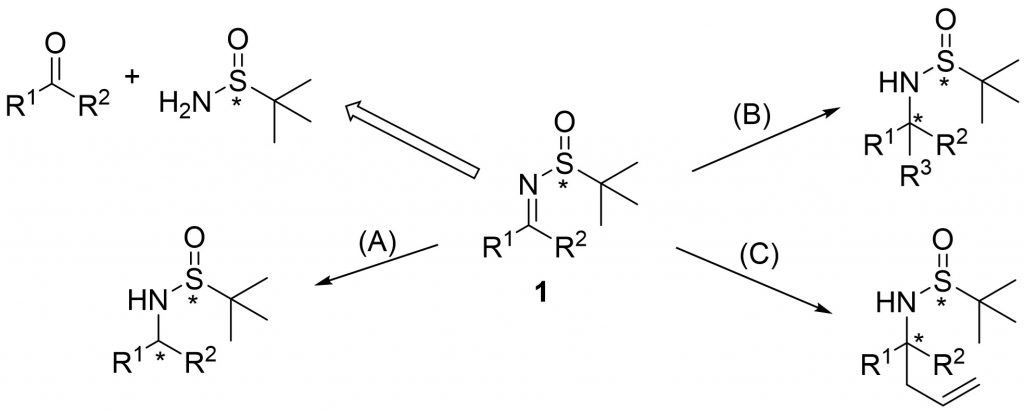- Palestrante: Miguel Yus (Universidad de Alicante);
- 29 de maio de 2018 às 17h;
- Sala: 774L
Abstract:
Chiral N-sulfinyl imines, especially the corresponding N–tert-butyl substituted derivatives 1 [1] are interesting starting materials in asymmetric synthesis because (a) they are easily accessible (from carbonyl compounds and chiral sulfinamides) in both enantiomerically pure form, (b) the sulfinyl group activates the imine moiety towards nucleophilic substitution so, in the reaction with different nucleophiles an asymmetric induction takes place giving an diastereoenriched product, which can be easily separated into the corresponding pure diastereomers, and (c) the deprotection of the amino group, after the addition of the nucleophile can be easily achieved by simple treatment with hydrochloric acid. In this presentation, the reactivity and synthetic applications of these materials in the (A) ruthenium-catalyzed hydrogen transfer [2], (B) addition of alkyl zincates [3], and (C) indium-promoted allylation [4] will be considered (Scheme). Especial attention is paid to the synthetic applications of the mentioned processes, mainly for the preparation of natural or unnatural alkaloids and amino acids [5].

Scheme
__________________________________________________
[1] (a) J. A. Elman, T. D. Owens, T. P. Tang, Acc. Chem. Res. 2002, 35, 984. (b) J. Ellman, Pure Appl. Chem. 2003, 75, 39. (c) M. A. T. Robak, M. A. Herbage, J. A. Ellman, Chem. Rev. 2010, 110, 3600. (d) F. Foubelo, M. Yus, Eur. J. Org. Chem., 2014, 485-491. (d) F. Foubelo, M. Yus, Chem. Today 2016, 34 (4), 45-49. [2] D. Guijarro, O. Pablo, M. Yus, J. Org. Chem. 2013, 78, 3647, and references cited therein. [3] R. Almansa, J. F. Collados, D. Guijarro, M. Yus, M. Tetrahedron: Asymmetry 2010, 21, 1421, and references cited therein. [4] J. A. Sirvent, F. Foubelo, M. Yus, Eur. J. Org. Chem. 2013, 2461, and references cited therein. [5] This work has been supported by the Spanish Ministerio de Ciencia e Innovación (MICINN) (Consolider INGENIO 2010 CSD2007-00006, CTQ2011-24151, and CTQ2011-24165), the Spanish Ministerio de Economia y Compe-titividad (MINECO) (projects CTQ2013-43446-P, CTQ2014-51912-REDC and CTQ2014-53695-P), FEDER, the GeneralitatValenciana (PROMETEO 2009/039 and PROMETEOII/2014/017), and by the University of Alicante.
About:
Miguel Yus was born in Zaragoza (Spain) in 1947, and received his BSc (1969), MSc (1971) and PhD (1973) degrees from the University of Zaragoza. After spending two years as a postdoctoral fellow at the Max Planck Institut für Kohlenforschung in Mülheim a.d. Ruhr he returned to Spain to the University of Oviedo where he became associate professor in 1977, being promoted to full professor in 1987 at the same university. In 1988 he moved to a chair in Organic Chemistry at the University of Alicante. Professor Yus has been visiting professor at different institutions and universities among them ETH-Zentrum, Oxford, Harvard, Uppsala, Marseille, Tucson, Okayama, Paris, Strasbourg, Bolonia, Sassari, Tokyo and Kyoto. He is co-author of 625 papers (and six patents) and has supervised 63 Doctoral Theses (already presented), and delivered more than 200 lectures, most of them abroad. At March 2018 his h index is 68. Among others, he has received the Spanish-French Prize (1999), twice the Japan Society for the Promotion of Science Prize (Okayama 2000, Kyoto 2007), the Stiefvater Memorial Lectureship Award (Lincoln 2001), the Nagase Science and Technology Foundation fellowship (Kyoto 2003), the Cellchem Lectureship (Sheffield 2005), the Singenta Lectureship (Basel 2007), the Fundeun-Iberdrola Prize (Alicante 2007), the Serratosa Lectureship (Barcelona 2010), the Conferencia Lourenço-Madinaveitia (Lisboa 2012), the Medalla Felix Serratosa from the RSEQ (Madrid 2012), being also named Active Academician from the European Academy of Sciences and Arts (Salzburg 2012) and recently Member of the Athens Institute for Education and Research (2016). Professor Yus has been in the Advisory Board of 20 international journals, among others, Tetrahedron, Tetrahedron Letters, European Journal of Organic Chemistry, Chemistry Letters, The Chemical Record, Current Organic Chemistry, Current Chemical Biology, Jordan Journal of Chemistry, Applied Sciences, and Trends in Organic Chemistry, being also Editor-in-Chief of Letters in Organic Chemistry, Open Chemistry, Modern Organic Chemistry Research and Chemical Engineering, as well as Regional Editor of The World Journal of Chemistry. His current research interest is focused on the preparation of very reactive functionalized organometallic compounds and their use in synthetic organic chemistry, arene-catalyzed activation of different metals, preparation of new metal-based catalysts, including metallic nanoparticles, for homogeneous and heterogeneous selective reactions, and asymmetric catalysis. Professor Yus founded the new chemical company MEDALCHEMY S.L. to commercialize fine chemicals.